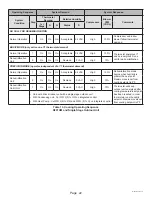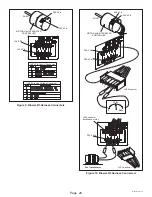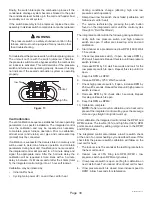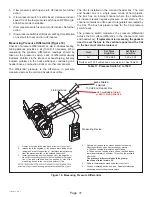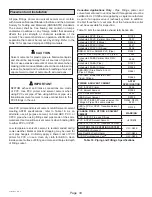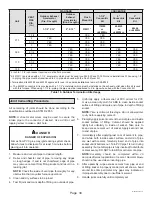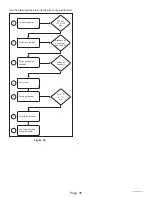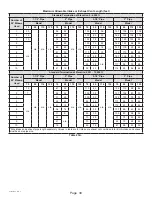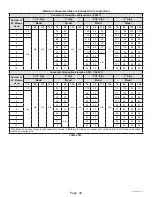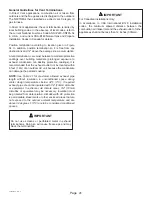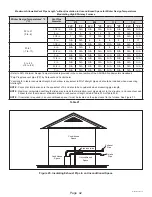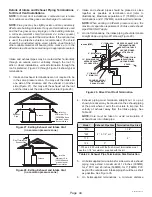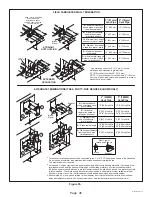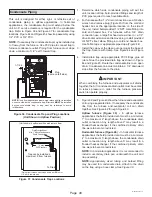
Page 34
31-5000723 Rev. 0
Joint Cementing Procedure
All cementing of joints should be done according to the
specifications outlined in ASTM D 2855.
NOTE:
A sheet metal screw may be used to secure the
intake pipe to the connector, if desired. Use a drill or self
tapping screw to make a pilot hole.
DANGER OF EXPLOSION!
Fumes from PVC glue may ignite during system check.
Allow fumes to dissipate for at least 5 minutes before
placing unit into operation.
DANGER
1.
Measure and cut vent pipe to desired length.
2.
Debur and chamfer end of pipe, removing any ridges
or rough edges. If end is not chamfered, edge of pipe
may remove cement from fitting socket and result in a
leaking joint.
NOTE:
Check the inside of vent pipe thoroughly for any
obstruction that may alter furnace operation.
3.
Clean and dry surfaces to be joined.
4.
Test fit joint and mark depth of fitting on outside of pipe.
5.
Uniformly apply a liberal coat of PVC primer for PVC
or use a clean dry cloth for ABS to clean inside socket
surface of fitting and male end of pipe to depth of fitting
socket.
NOTE:
Time is critical at this stage. Do not allow primer
to dry before applying cement.
6.
Promptly apply solvent cement to end of pipe and inside
socket surface of fitting. Cement should be applied
lightly but uniformly to inside of socket. Take care to
keep excess cement out of socket. Apply second coat
to end of pipe.
7.
Immediately after applying last coat of cement to pipe,
and while both inside socket surface and end of pipe
are wet with cement, forcefully insert end of pipe into
socket until it bottoms out. Turn PVC pipe 1/4 turn during
assembly (but not after pipe is fully inserted) to distribute
cement evenly. DO NOT turn ABS or cellular core pipe.
NOTE:
Assembly should be completed within 20
seconds after last application of cement. Hammer blows
should not be used when inserting pipe.
8.
After assembly, wipe excess cement from pipe at end
of fitting socket. A properly made joint will show a bead
around its entire perimeter. Any gaps may indicate an
improper assembly due to insufficient solvent.
9.
Handle joints carefully until completely set.
Unit
VENT
PIPE
DIA.
(in.)
STANDARD
CONCENTRIC
Outdoor Exhaust
Accelerator
(Dia. X Length)
Outdoor
Exhaust
Accelerator
(Dia. X Length)
Flush
Mount Kit
1-1/2”
Concentric
Kit
2”
Concentric
Kit
3”
Concentric
Kit
1-1/2” X 12”
2” X 12”
51W11 *
71M80
or
+44W92++
69M29
or
+44W92++
60L46
or 44W93+
070
1
1-1/2
YES
YES
2
YES
YES
YES
2-1/2
YES
YES
YES
3
YES
YES
YES
090
2
YES
YES
YES
YES
2-1/2
YES
YES
YES
YES
3
YES
YES
YES
YES
110
2
YES
YES
YES
YES
2-1/2
YES
YES
YES
YES
3
YES
YES
YES
YES
135
3
YES
YES
YES
1
2 inch to 1-1/2 inch reducer required, must be field provided.
* Kit 51W11 is provided with a 1-1/2” accelerator, which must be used for all 45,000 and 70,000 furnace installations. When using 1-/2
in. piping, the pipe must be transitioned to 2 in. pipe when used with the Flush Mount Kit.
+ Termination kits 44W92 and 44W93 approved for use in Canadian installations to meet CSAB149.
++ The 44W92 concentric kit is provided with a 1-1/2” accelerator, which must be installed on the exhaust outlet when this kit is used
with this furnace. When using 1-1/2 in. piping, the pipe must be transitioned to 2 in. pipe when used with the Concentric Kit.
Table 19. Outdoor Termination Kits Usage



